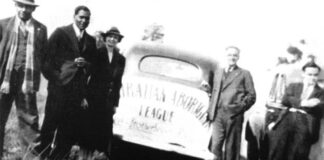The inquiry into the death of Brazilian student Roberto Laudisio Curti has thrown an international spotlight on the brutal use of tasers by the NSW Police. Curti was threatening no one. He was fleeing from police after stealing two packets of biscuits from a service station and probably suffering psychosis from LSD use the previous night.
Police used tasers to bring him to the ground during the chase. Eyewitness Tommy Wang says when police then set upon him, “They looked like a gangster mob trying to take down a young guy”.
A total of 14 taser “shots” were used on Roberto, along with three cans of capsicum spray. A baton and handcuffs were also used to “subdue” him. A short time later he was rolled on to his back with foam coming from his mouth. He was not breathing and never regained consciousness.
Senior Sergeant Peter Davis told the inquest this use of tasers was justified and “within police operational guidelines”.

The introduction of tasers into Australian policing has been justified by the myth that they provide a “non-lethal” alternative to guns. But there has been no decrease in gun use since their introduction in 2000 and an increase in some areas.
A 2010 WA Corruption and Crime Commission report found that police routinely use tasers to get people to comply with their orders. In the most extreme case, a man already in police custody was tasered 41 times.
Curti’s death shows how questionable the categorisation of tasers as a “non-lethal weapon” is.
Racism
Taser usage throws into sharp relief the racism of the police force. Although they represent just 2.4 per cent of the population, 30 per cent of taser use is on Indigenous people.
At Roberto’s funeral in Brazil, people protested the police’s actions, wearing t-shirts with “mourning justice” printed on them.
Aboriginal people in Australia know well that there is no justice in the justice system. The police will not be brought to account without a fight.
It took a riot on Palm Island and mass protests across Queensland for Senior Sergeant Chris Hurley to be charged over the death of Mulrunji Doomadgee in 2004, despite Hurley’s violence clearly causing his death and the Coroner recommending charges. This was only the second time in Australian history that charges had been laid against a police officer for an Aboriginal death in custody. Hurley was eventually acquitted by an all white jury.
Justice for Briscoe
Right now in the Northern Territory the family of Kwementyaye Briscoe are showing us how to fight. The coroner’s report into the Anmatjere man’s death on January 5 this year laid blame clearly on police negligence.
Briscoe’s family has led a strong campaign calling for charges to be laid for negligent manslaughter. Demonstrations have taken place across the country, and a fiery protest in Alice Springs on October 5 occupied a building during an NT government meeting.
At the time of printing, more than 16,800 people have signed an online petition calling for charges to be laid. A demonstration is being organised in Alice Springs for Human Rights Day, December 10, to present the petitions to the new NT government.
A rally planned for Darwin on the same day will protest the death of Mr E Lewis, an Aboriginal man who passed away in Katherine on September 23, shortly after being released from police custody. Mr Lewis was diabetic and only had one leg.
His sister Dorris Lewis said in a media statement, “Many witnesses have told our family that he was treated very roughly when he was taken into custody. He was dragged and thrown.”
“Before he passed away, my brother was telling his family that he had also been treated very roughly in the watch house. He also said that he had not been fed or given drink or any medication. He could hardly sit up when he got home. After he had struggled to eat some food he went to sleep and passed away.”
His family are also demanding repercussions against police over the death, as Dorris explained,
“We can’t just let this go. We believe that the police must be held responsible. Unless there is some justice, they will just keep treating our people like this.”
By Geraldine Fela





